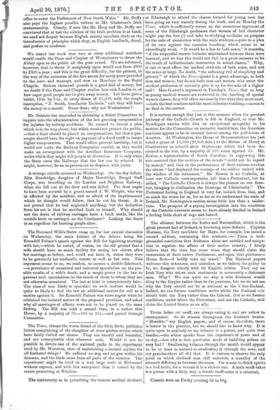The controversy as to permittiog the women medical students
at Edinburgh to attend the classes formed for young men has been going on very warmly during the week, and on Monday the Times, which is sufficiently severe on the monstrous argument of some of the Edinburgh professors that women of bad character might pay the fees (!) and take to studying medicine on purpose for the sake of association with the male students,—puts in a plea of its own against the common teaching, which seems to us exceedingly weak. " It would be a loss to both sexes," it remarks, "if the respectful reserve hitherto maintained between them were lessened, and we fear this would not fail in a great measure to be the result of indiscriminate instruction in mixed classes." Why, it can at most affect the medical students of both sexes, and not the sexes at large. No doubt, "the softening veil of simplicity and privacy" of which the Times speaks is a great advantage, to both men and women, but do not both men and women who enter the medical profession of necessity give it up for the sake of a higher end ? Miss Garrett's argument in Tuesday's Times, that so long as young medical women are restricted to the teaching of special women classes, they will often necessarily lose what they most need, —both the best teachers and the most elaborate teaching,—seems to us final in the matter.


































 Previous page
Previous page